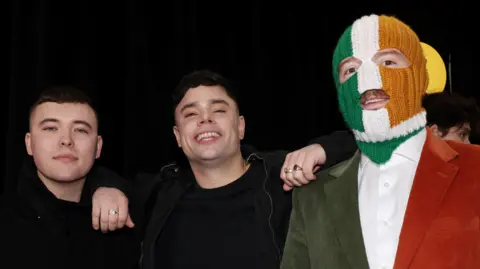In a recent outcry, Brendan Cox, the husband of the late MP Jo Cox, has intensified calls for the rap group Kneecap to issue a “real apology” after a controversial video surfaced, in which the band appeared to endorse violence against politicians. This incident has reignited discussions surrounding the implications of performative art and political expression, especially in the context of the recent violent acts against political figures in the United Kingdom.
Jo Cox, a prominent Labour MP, was brutally murdered in June 2016 by a far-right extremist named Thomas Mair. The tragedy has left a profound impact not only on her family but on the political landscape as a whole. Brendan Cox expressed his discontent regarding the band’s response to their actions, labeling their apology—issued after backlash—for the alleged inflammatory comments in the footage as inadequate. He described it as “only half an apology,” prompting the necessity for a more comprehensive acknowledgment of the gravity of their implications.
Kneecap, known for their provocative lyrics and performances, initially took to social media to address the uproar. They claimed that the controversial footage had been “deliberately taken out of context” and suggested that public interpretations were “exploited” and mischaracterized as inciting violence against MPs. They categorically denied any intentions to promote violence, extending their condolences to the families of both Jo Cox and Sir David Amess, another MP who was murdered in 2021.
Brendan Cox’s criticism of the band’s remarks highlights the complications that arise when artists engage with politically sensitive themes through their craft. He articulated that while they expressed sorrow, their framing of the situation seemed to insinuate a conspiracy against them, which diminished the sincerity of their intended apology. “It’s fine to say that you’re sorry for it, but the way that they have actually spoken about it is to suggest that it’s a conspiracy,” he noted, reinforcing the idea that a genuine apology should involve taking full responsibility and understanding the potential fallout of one’s words.
Counter-terrorism police are currently evaluating the footage in question, indicating the serious nature of the allegations that Kneecap’s comments may incite violence. Kemi Badenoch, the leader of the Conservative Party, has called for legal repercussions for the band if it is deemed necessary. This kind of governmental intervention raises significant questions about the balance between freedom of expression and the potential incitement of violence, especially in our increasingly polarized political environment.
Additionally, the daughter of Sir David Amess echoed similar sentiments, asserting that Kneecap owed an apology directly to the victims of political violence and their families. Brendan Cox extended an olive branch, suggesting he would be willing to meet with the band if it involved a sincere examination of their statements and a commitment to renouncing violent rhetoric in political discourse.
The issue transcends merely the statements made by Kneecap; it encompasses a broader debate about how artists should navigate their responsibilities when intertwining political statements with artistic expression. Mr. Cox conveyed that discussions surrounding political radicalism should maintain clear boundaries against advocating violence towards others, underscoring the ethical obligations creative individuals have in society.
Kneecap further complicated their position by referencing their views on global issues, such as the humanitarian crises involving Palestinians, stating they have been misrepresented and that the indignation surrounding their comments was an attempt to stifle political expression. Their retort signifies the delicate line between political dissent and the consequences of inciting actual violence, ultimately questioning the genuine motivations behind their art.
This episode reinforces the reality that artistic expressions can wield significant influence and must be conveyed with caution and responsibility. It calls for artists to engage deeply with the implications of their words and actions, ensuring they acknowledge past mistakes and collaborate towards building a more constructive political dialogue, lest they risk becoming agents of division rather than unity in the face of societal challenges.



